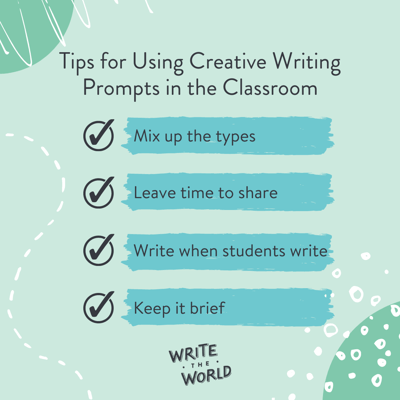Like so many of you, Tara Lynn Masih started to take writing more seriously during high school. As...
By: Asiyah Jilani
Here are some unique creative writing prompts for high school that students can use to think creatively, expand their writing skills, and find enjoyment in writing. The prompts are sorted by genre, including poetry, science fiction, flash fiction, narrative, and even some creative and open choice prompts.

Poetry Prompts for High Schoolers
- Beginnings - Write a poem where every line begins with the same letter.
- Diminishing Verse - Write a poem in which the end word in a line is the same end word in the previous line, but with the first letter removed. A three line stanza, for example, could have the following end words: “smart”, “mart”, and “art” Or, rather than removing a letter and keeping the spelling of the remaining word the same, you have the option to remove sounds. “Stare” could turn into “tear”, for example, and “tear” into “air”.
- Collective Nouns - Write a poem with a collective noun as its genesis and theme, highlighting the characteristics of a creature we share the planet with. Seek to emphasize the poetic nature of these terms; for example, alliteration in ‘a parcel of penguins’ or the imagery of ‘a bouquet of hummingbirds’. If you’re feeling extra creative, invent a collective noun of your own to include as the basis of your poem.
- Life through a Window - Write a poem that captures the images of life and activity seen through a window over the course of one single morning, day, evening or night.
- Fan Poetry - Write a poem imitating the style of a popular poet, whether it be a Shakespearean sonnet or a naturalistic poem like those of Mary Oliver’s. Be sure to include a footnote, crediting the poet or poem that inspired your piece.
Science Fiction Creative Writing Prompts for High School Students
- Solar Power - In 1960, physicist Freeman Dyson proposed a hypothetical megastructure that could encompass a star and suck energy from it to power the earth—an idea known today as a "Dyson sphere." What are the benefits of energy captured from a star? The consequences? Imagine what the world would be like with a Dyson sphere. In prose or poetry, take us into a scene or offer a description of this reimagined world.
- False Familiarity - Medically, déjà vu is false familiarity. Your brain creates an illusion of a feeling that you have lived this moment before. But what if there was more to the story? Write a story explaining déjà vu through fantasy or the supernatural. Is there more to the illusion? Maybe it’s a wild mind control conspiracy in a distant future world, or maybe a disorganized higher power forgot to finish sculpting human minds properly. Be as creative as you like!
Personal Narrative Prompts for High School Students
- Lost things - Anywhere from a paragraph to a page long, tell the story of an object that you’ve lost, detailing: 1. How it was lost. 2. How it changed you. 3. Where you imagine it is now.
- Your world in three senses- Think of a place you love... transport your readers there with three detailed and telling descriptions, each using a different sense: SIGHT, SMELL, SOUND, TASTE, or TOUCH. Perhaps it's the feeling of the dry desert wind that defines this place for you. Perhaps it's the sound of the dogs howling. Perhaps the smell of smog or sea salt. Pick details that are particular and specific, and bring them to life with vivid sensory language.
- Subtotals - In his story, “Subtotals,” Gregory Burnham shares details of his life in number form. For example, he tells us how many rotten eggs he's thrown (1), the number of postcards he's sent (831), the number of miracles he's witnessed (0). Write a story composed of subtotals from your life. Try to select and pair subtotals that speak to each other. For example, the following two numbers aren't very interesting on their own, but together they tell a story: "Number of compliments, given: 4,051; accepted: 2,249."

Flash Fiction Creative Writing Prompts for High School Students
- 99 words - “There was more room to think,” wrote novelist David Gaffney on becoming a flash fiction convert, “more space for the original idea to resonate, fewer unnecessary words to wade through.” Stories of the sudden/skinny/mini/micro variety pack the best parts of fiction into brimming, half-pint packages. Celebrate the art of concision, and write a story in 99 words or less.
- All in a minute - Write a story that takes place in one minute of your character's life. Avoid flashbacks (memories or information from the past) and flash forwards (projecting into the future). Instead, focus on the details of the moment.
- Countdown - Write a story in which your first sentence should have ten words, your second nine words, your third eight, etc., until you’re down to one in your final line.
Check out more flash fiction and other writing resources.
Other Creative Writing Prompts for High School Students
- Global Correspondence - Respond to a current event, whether it be local, regional, or global, in your choice of writing form.
- Advertising - Write an advert for a product that doesn’t exist.
- Feel the Music - Write a story about a pair of headphones that actually take you inside a song.
- Personality traits - Write about an argument between two different traits of someone’s personality.
- Other shoes - Put yourself in shoes that you wouldn’t normally imagine yourself in. Create a scenario for that fictional character. Embody a protagonist that showcases your wit, empathy, and imagination as a writer.
- Selecting a Reader - In his poem, ‘selecting a reader’ Ted Krooser cleverly imagines whom he would want to be his reader, and how he would like them to treat his work. imagine your reader in vivid detail - their appearance, thoughts, actions, inner world… how might they have arrived at your writing? How do they interact with it? Describe their idiosyncrasies, intentions, and consider how your writing will affect them!
- Musical - Write a piece inspired by your favorite song.
- 200 years ago - Imagine traveling back 200 years, to the exact spot where you are right now. Who was here? How did the landscape look different? Write a passage of historical fiction that takes place in your current location!
- Subtotals - In his story, “Subtotals,” Gregory Burnham shares details of his life in number form. For example, he tells us how many rotten eggs he's thrown (1), the number of postcards he's sent (831), the number of miracles he's witnessed (0). Write a story composed of subtotals from your life. Try to select and pair subtotals that speak to each other. For example, the following two numbers aren't very interesting on their own, but together they tell a story: "Number of compliments, given: 4,051; accepted: 2,249."
- The Pangram - A Pangram, or “holoalphabetic” sentence, contains every letter of the alphabet at least once. Take the following, rather infamous, pangram: The quick brown fox jumps over the lazy dog. Try your hand at crafting a perfect pangram, or instead use this restricted form to craft the basis of a longer sentence, or even story. You could even link a few pangrams of varying length together.
- First meeting - Think of your favorite fictional character. What would you say to each other?
- Lens change - Write about a particular memory of yours, but in third person instead of first person.
- You - Write a passage of fiction, employing the second person—“you”—point of view.

Tips for Using Creative Writing Prompts in the Classroom
Writing prompts and other activities are low-stakes and can help to create a culture of writing in your classroom. Here are a few tips to getting started:
- Mix up the types of prompts to connect to your curriculum or promote creative thinking.
- Leave time to share some responses out loud and build a sense of community.
- Write when students write to model continuous learning.
- Keep it brief and open to interpretation.
Looking for more tips for using writing prompts as a daily classroom practice? Check out the full Tips for Using Daily Writing Prompts and other resources for teaching writing.





